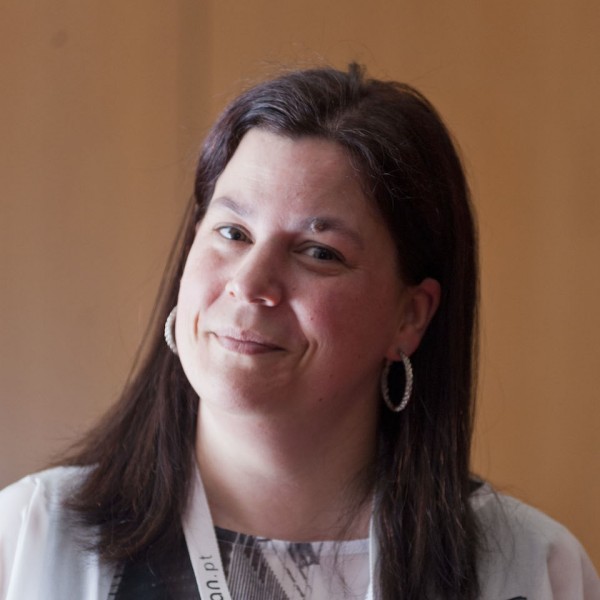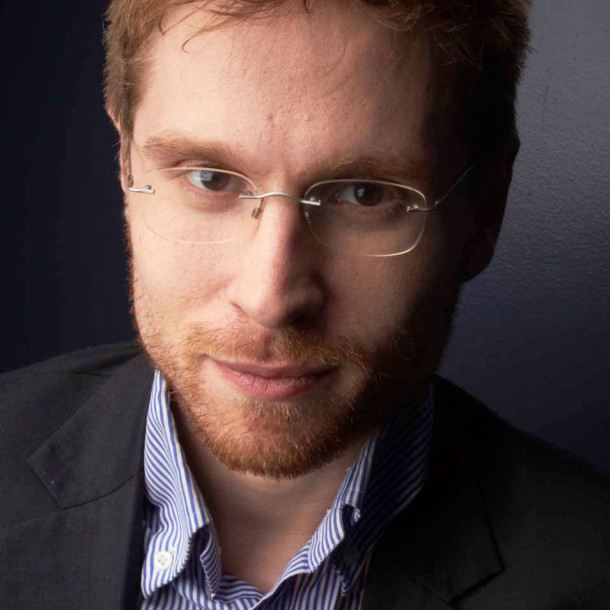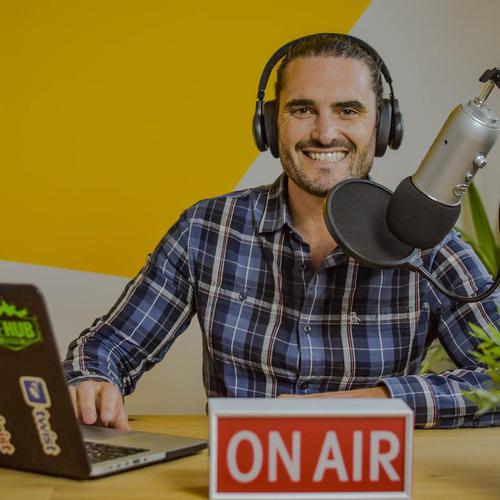Darrian Mikell has a unique take on what the most human medium is in the current digital workplace.
It’s not video, or VR. It’s audio.
Darrian says there’s a lot of human advantages to audio, particularly recorded audio.
- It’s usually less scripted. Both video and text tend to be either rehearsed or edited, while audio is normally extemporaneous.
- It’s more intimate. Audio quality is pretty high these days and humans are wired to notice very subtle differences in how people speak. So, we can make a deeper connection when we are centered on someone’s voice.
- It carries more of the message. More than punctuation, or body language, it’s the intonation that impacts the meaning of a phrase. Audio controls that more than other mediums.
- It gives unique focus options. It’s the one medium that allows for multitasking; you can still be engaged in audio while driving. It can also be even more focused than video because you aren’t staring at a screen and potentially distracted. Walking meetings are pretty incredible as well.
- It’s more frictionless. Ask someone to make a video of themselves and they’ll start stressing about the quality of the camera, the lighting, and getting it right on the first take. But most people are fine to record an audio message quickly and send it out.
Darrian and his team have doubled down on audio and built an entire company off of it. They’ve developed a tool for recruiters to get quick and consistent answers from candidates. The short, recorded questions keep the conversation on topic and help to divert natural biases from creeping in.
Darrian talked a lot about the importance of diversity in a founding team. It’s not necessarily something that you can add in later on, and keeping a fresh perspective is important throughout the entire lifecycle of a company.
Links
Welcome back to The Digital Workplace podcast. Today our guest is Darrian Mikell. He is the Co-Founder and CEO of Qualifi. Hey Darrian, how are you today?
I’m doing great. Thanks for having me, Neil.
I’m very excited to have you on man. You have an interesting story and a very exciting company that’s here at the right time. But first, we got to test to make sure you are a true human, not a robot on the show. We are not opening up to robots yet. So, your question is, what’s something you’re thankful for today?
That is a good one. I think this might come off weird. I’m thankful for the pressures I was just talking to my wife about. We both have a lot going on in our life right now. I’m starting and running a company that in itself is a lot. I have a few young children, that’s a lot of pressure, and she’s also in nursing school. All those things can be really stressful but seen in a couple of places now. But that pressure is a privilege. There’s a lot that we’re being entrusted with and I’m thankful for that because a lot of those things are, I guess, they’re stressful, hard to keep up in the air. But for the most part, they’re going really well right now. So, I’m really thankful for how that’s tracking in my life.
It’s excellent, man. I appreciate you saying that. It’s always good to remember that certain pressures are privileges to have. So, it’s a good perspective. Cool. Well, let’s get into it. You talked about the company you have and that you started. Give us the story. How did you get into it and what is Qualifi? What does it do?
Yes, Qualifi, Qualifi.hr. I got started because of pain points that I experienced myself when I was leading recruiting in HR at a previous company. So, I was at a company called Viral Launch. It’s based in Indi as well, and it was on a really fast growth track when I was there. The founder was a friend of mine, and he brought me on to assume a co-founder type position. I was the VP there, and oversaw the operation side of the business, and that included a variety of different hats that I was wearing, including finance, the general, legal, admin stuff and then also, like I said, the recruiting and HR. We went from zero to, I guess, effectively, he and I, to over 70 people on the team in about three years and I was in charge for roughly like the first 40-50 hires or so.
And so, for me, it was just a really busy, busy time period, a lot to juggle, and I found this specific step in the hiring process, the phone interview, to be really cumbersome. There’s a lot of scheduling, a lot of coordination that goes into it, if you’ve ever been a part of one or if you’ve ever conducted them yourself, then you probably know that it’s really repetitive. You’re on the phone constantly. It’s interrupting your normal workflow. And so, that was the case for me. And now we’ve solved that problem for customers that are typically recruiting teams that recruit in high volumes.
So, what we provide is a solution that lets them pre-record audio-based questions so they can use their own voice to create interview sets that are then standardized, but still personal. And then they can invite hundreds and interview hundreds of people, even on the same day that those candidates apply to a position. And then from their experience, they click a link to get started after they receive a text or an email invite. They read some instructions and when they’re ready, they hit start and our system will actually dial their phone.
So, they can do it over a cell phone or a landline and then they navigate through those pre-recorded questions over a standard phone call, very similar to answering voicemail questions. We record it, transcribe it, and then the recruiting team can listen to it, share it with their team and move candidates a lot faster through a process and make better decisions from it.
This is obviously a core issue right now. I mean, everyone is trying to figure out how to do recruiting better, trying to figure out how to retain people, too. Everyone’s looking to bring in new people. So, as you look at the industry that you’re in, in terms of recruiting and HR, what’s the exciting thing that’s going on there? Is everything just chaotic right now? Or do you feel things are really improving and we’re seeing a lot of advancements?
Yeah, I think things definitely are constantly chaotic, especially in the time period that we live in, obviously with everything going on. I think there’s encouragement. There’s been a lot of investment and investment in companies like mine but then also in terms of folks investing in HR resources in general. I think there’s been a lot of focus on, how do we, like you said, hire the best people or retain the best people and create better systems around how we build our workforce. So, that’s really encouraging and exciting. Obviously, being biased in terms of us building in that industry, but, just as a whole, seeing companies try to figure out ways to invest in their people will be better about it.
Yeah. Let’s dive deep into some of this overlap. Like you have these audio of somebody recording their own voice, so it feels very in-person or at least like back to phone call days that were there. But then we’re also trying to blend in all these highly advanced technology tools that are there. What is it about the audio of voice? Do you feel it is a difference maker that a recruiter or a candidate is really going to be like, ‘Yeah, I want that’ because it still makes you feel that human connection, as opposed to just saying, ‘Hey, here’s a form. Just fill it out when you can.’
Yeah. So, there’s definitely different layers in terms of, or I guess mediums I should say, in terms of how people are thinking about different aspects of the recruitment process. Obviously, there’s text and forms, there’s video. We sit in the middle with ‘voice’, and are really excited about it because we have a lane mostly to ourselves right now. It’s really exciting to be able to provide a unique solution to a lot of the recruitment teams that we work with.
But the cool thing about voice is that it is still that human aspect. So, it’s rich data in terms of the voice being a very human centric thing, as opposed to text. If you’re talking about the context of recruiting, if I send you a form as a candidate to say, ‘Hey, respond to this’, you can take as much time as you want. Depending on the nature of that question, you can essentially pander in whatever direction you think the recruiter wants to hear. In the way that we format the questions, it’s more of a live conversational response. So, you get that raw, unscripted answer from them which may be more telling given the context. So, I think that’s one of the biggest things.
And then just the frictionless nature. Again, with forms or with other mediums, the fact that you have to sit down and do the work either on the form or for the video, there’s the friction of having a webcam that you have to get dressed up for, the internet quality issues that you have to worry about, maybe you don’t have a webcam and you have to go somewhere else, things of that nature. Most people have a phone and so they can respond really quickly and seamlessly which is a big advantage for recruiting teams because it creates a faster response time and allows them to take action quicker and move those candidates, hopefully, the best candidates, through the process a lot faster.
Yeah. And I want to know too more about the way your teams are set up. Because you’re seeing a lot of companies that, when you make that switch to the digital workplace, oftentimes, there’s emphasis on text-based communication. Because I think, especially if you look even five years ago or so, all of the companies that were fully virtual, that were fully distributed, were all saying, ‘Look, everything’s about written communication. You have to be able to write well if you’re going to succeed in this world.’ But you’re starting to see a little bit more of tools like yours, that are leaning into voice only. So, there’s this video that’s out there saying, ‘Okay, we’re going to switch everything from these in-person meetings we have to Zoom meetings’ like that. But then now, we’re starting to see some things that are like asynchronous voice, which at first was like, why would we need that? We can either have one or the other. But we’re starting to see there’s some use for this and there’s an interesting place, like you said, it’s an interesting line you can be and it’s there. So, talk more about that. And especially just within your own team, do a lot of people prefer to be voice? Or do you lean more towards tech space? Or what’s your team like?
Yeah, I’m a big fan of asynchronous tools. I think my team secretly makes fun of me. Yeah, so we want to use Slack, which is, I guess, asynchronous in nature. But it can be a little disorganized at times. So, I think that they’re like, especially virtual teams like us, have to be disciplined around those, where the flow of communication happens and setting up the proper channels to be able to capture things, document things. So, we use Slack, we use Notion, things of that nature to do our best to capture and organize around that.
But also, where I say they make fun of me is I recently started utilizing asynchronous voice within Slack. So, there’s different tools. There’s one that’s called Yac that I started using. Basically, you can send voice messages or video messages in Slack. Slack actually came out very recently, I think just over the last couple of days, with their own version of that so I switched to testing that out, but effectively the same thing. You can send voice memos, and a video of yourself or of the screen you want to share as little clips that you can send.
And I love that, especially for more complex thoughts that we don’t need to do a meeting right now to hash this out. But I want to get this message across, but it also might not be easy for me to type down, or I might be mobile right now or like walking around or doing something else where I can’t sit down and type something out. So, I love that asynchronous voice and video for those reasons.
Yeah. You also mentioned that asynchronous voice tends to be more unscripted. I mean, you could sit there and type out all your answers you’re going to put in the form and then rehearse it. But then you pretty much guess if somebody’s doing that. So, there’s an element of saying, okay, if I’m going to type you an email, type you a Slack message, hopefully, I’m taking five seconds to read over that before I send it. So, it gives me a chance to step back and edit it as it goes through. Whereas voice tends to be, yeah, you can listen to it, but it’s hard to make just one little change. You got to change the whole thing when you send it through. So, talk more about that. Why is that an advantage when it comes to recruiting or any kind of communication?
Yeah. So, I might need clarification on that. So, like in the context of internally using those voice products, I find myself starting off in one direction, maybe saying like umms or like re-shifting my train of thought as I’m talking in the moment. And so, that can be funny through internal conversations. But what we found with recruiting in the way that the interviews are laid out is that it’s helpful because unlike a live interview where conversations may tail off in different directions, with us, it’s structured in nature. And so, despite it being unscripted, it follows a set path in terms of the questions that are being asked. And so, candidates tend to stay pretty pointed to the question that they’re responding to.
But then as a recruiter, you have the ability to listen back to that with all the functionality of a typical audio player. So, you can play, you can jump around to different questions, you can pause, rewind, play multiple speed variations for the power listeners out there. And so, it affords you that opportunity.
Because oftentimes recruiters aren’t, when they’re not recording their conversations, they’re often trying to scratch down notes when they’re talking, which doesn’t give you the full context, especially if you’re passing those notes off to a hiring manager or a decision maker. So, Qualifi gives them that ability to capture that full set of data and allow them to make those decisions together, collaboratively, and more effectively.
Yeah. Well, cool. We’ll zoom out a little bit. Tell us about your team. How big is your team? How much have you grown recently? What’s new for you?
Yeah. So, this year has been, I guess, a relatively considerable amount of growth for the team. So, coming into this year, it was just myself and my brother that were full time. We have two other co-founders that we got to bring on full time at the beginning of this year, or actually, yeah, we brought on a co-founder, and then later in the year brought the last co-founder on. So, there’s four of us. And then we’ve since added four more full time employees, and right now we’re hiring. So, our team will be up to 12 here really soon.
And we’re fully distributed. Most of us are based in the Indianapolis area. But we have someone starting here soon in Chicago. And then one of our teammates is in Nashville, Tennessee. And then, like I said, we plan to hire remotely. And so, some of the candidates that we’re talking to right now are in different states as well. So yeah, that’s what our team looks like right now. Like I said, four co-founders. I’m more operational in nature. My brother who I mentioned is sales and product and operations as well. We have two technical co-founders, a couple of sales folks, marketing, senior marketing manager, and then a junior engineer as well.
So, as you build out this remote team, but the core team is all together, how are you going to make that blend? Because we’ve seen that kind of attention to some people to say like, Okay, well, I’m remote. I’m sitting in Nashville, or I’m in Atlanta or I’m somewhere else. But I know the power center, they’re all getting together. They’re all hanging out in the evenings and talking about stuff, and I miss that kind of thing. So, how are you going to navigate those waters?
Yeah, that’s interesting. I think it’s something that I personally am going to continue to learn about. One, most of our communication like I talked about happens in the channels that everyone has access to. So, like Slack. We try not to do a lot of email internally, unless it’s forwarding things along from outside vendors and things of that nature. And then, we try to have set rhythms as a company where we’re meeting on a weekly, monthly, and quarterly basis around certain topics or certain areas of the business and having again all this happening virtually. So, I think most of our business-oriented communication happens where everyone can be accessible to it.
The other aspect though is, we still want to try to, and I think that in-person connection is still important. So, when and where we can, especially if there’s a good chunk of folks in different regions, we’d love to continue to meet, you know, get together in-person just to connect on an individual level. So, we do have a get together coming up here soon. I think it’s actually next week, where we’ll be able to get together, have some fun, and really just connect on a personal level. And as the team grows, we’ll find different ways to do that. I know some teams have done retreats and things of that nature. That’s something that we have talked about and plan to do as well. So, yeah.
And pretty common on most distributed teams to do those things. And I think there’s one thing we ought to remember that the last year and a half has not been typical remote distributed work. The fact that we can get together and travel and meet with one another, is not really optimal even in a distributed setup.
Yeah. And like when we first started the business, it wasn’t in the plans to be remote. Actually, before pandemic life, I was one of those people that said I don’t like working from home. Like I mentioned, I have a couple of young kids at the house and so sometimes it’s a distraction for me to just want to go hang out with them or do other things besides work. And what I found is being forced into it created a different mindset around it, and I personally enjoy it.
Most of my team really loves working remotely as well. So, it’s a preference at this point for, like I said, for most of the team. So, for me, I just want to be strategic around that, knowing that there are differences. There’s pros and cons of remote life, and like I said, continuing to research to figure out different ways to improve on what it looks like to work at Qualifi and work remotely.
Darrian, as you are building out your team, you’ve got a product that’s good and that you know people like and want to use and now you’re looking at building the company out. What are you most passionate about when it comes to rebuilding work for the digital age, as you look at the kind of company you want to be in the next three, five years? What’s something that you really want to be known for that’s different from organizations in the past?
Yeah. It may not specifically apply to just the digital workforce. But for me, as an entrepreneur, I tell people all the time that I have ideas for days. Hopefully, some of them are good. In terms of new products, new ideas, I’m just an idea person. Qualifi was just one idea that really stuck and that we were able to build upon. And so, with that in mind, my favorite thing is really collaborating with people. I know my limitations. Like I said, I have good ideas but nothing about Qualifi would have happened if we didn’t have the people that we have around us. And so, that’s what’s more fun for me. That’s what I get passionate about, is just creating an environment that people can thrive in and enjoy.
And then a big thing for me and for us as a company is creating a diverse culture. I think that that’s where the digital workplace can have its advantages, to just being able to have a broader reach in terms of where you’re recruiting from. We started off really well. Like I said, we have four co-founders, three of us are black. Our team is, if you look at us, I think we look a lot different than the typical company in the Midwest because we’ve had an intentionality around what we want our company to become.
So, we want to be attractive to lots of different types of people and continue to do great work with good people. And so, I think that’s one of the things that I get passionate about is, like I said, just generally creating an environment that people love to be in, love to work. You spend a considerable amount of your day with a certain group of people, so allowing people to enjoy the work they do, enjoy the people they do that work with, and creating opportunities for a wider set of people, especially in the tech community.
Yeah. When you talk about rebuilding work and providing more opportunities for people, I mean mentioning that three out of the four founders are black, that’s different. In the tech world especially, it’s tough to find that. So, what is it that makes Qualifi stand out in that way? It’s one thing just to have the numbers that are there. What’s the unique thing that when somebody walks into your place they realize, well, this isn’t just a whitewash or a place or something like that? These guys know. They understand my community, they understand where I’m coming from. What are some of the differences that will be there in your culture?
Yeah. I think, one, our approach to recruiting. We’re still young. So, it’s still being developed. But we’ve gotten really great feedback so far, obviously, like what the product is, how we put out in the world, and how I mentioned it’s personal and structured in nature. So hopefully, we’re helping to create that same sort of dynamics with our customers. But internally, we want to use our own products. So, every candidate is going to go through a consistent process there.
And then also, in terms of how we do live interviews, we want to be one, efficient, but two, structured, giving each candidate the same interview experience, asking some of the same questions across the board. And so, I think that’s one thing that we’ve again gotten really great feedback around and one thing that might look different compared to other companies in how they approach their recruiting processes.
Then also just like, I don’t know how to say, just like the feel of it, not the less tangible aspect of it, I think. One of the positives of having a diverse team is the diversity of culture that gets brought in. Culture is in part what you lay out as a founding team, in terms of like, here’s the vision we have for the company, but then culture is influence, and there’s aspects of being protective of that but allowing a lot of people to add to the culture. And I think that’s something that will look different for us as we continue to bring new faces into the mix.
Yeah. Darrian, I want you to end this off with telling us about one problem that you see, either you’re facing now, or you feel like it’s going to come up in the next year that you haven’t really found a solution to. So, what’s one thing you want to throw out there?
Yeah. And I might have not done a ton of research around this yet but one thing, and I keep thinking about is, especially recruiting in a remote environment, the typical places where you might post jobs, there doesn’t seem to be a great solution, at least that I’ve found, where you can post essentially synchronized job posts across different geographies. So, instead of just saying, ‘Here, here’s this job. It’s remote.’ For instance, and I don’t want to bash any different products, but if you post on Zip Recruiter, which is a service we use, you set the geography around a certain location, like within 50 miles of this, you know, specific address.
But I think it’d be great to be able to hit different pockets in a targeted way to bring out the different candidates that might be in specific areas that you want to recruit in. I’m sure there’s something out there. So, if there is, send it my way. I’m definitely interested in it. But that’s one thing that I’ve come across in terms of recruitment challenges, you know, especially as recently as recruiting the team.
Yeah, that’s a great point. Because I feel like there are definitely the traditional boards that are out there that are more location based. And you have totally separate boards that are out there that are just totally remote. So, if you want a remote job, you go there.
Right. Yeah, whatever remote job is there. Suppose it’s like, what if I want to just post one single job posting, and then that service posts it in Atlanta and in Dallas and San Francisco and New York, like, just simultaneously, but it appears to the candidate as like, ‘Oh, Qualifi is hiring in New York’, as opposed to hiring generally remotely. I think that’d be interesting.
That’s a great one. I feel recruitment in general is overdue for a lot of overhauls when it comes to the technology around it, but also the approach to it and how we think about it. So, this is great, and I love what you’re doing, too.
I appreciate it. Yeah. Thank you so much.
Well, good. Darrian, thanks for being on the show and for what you’ve done with Qualifi. We’re excited about what you’re doing. Tell people where they can go if they want to learn more about what you got.
Yeah, it should be pretty easy. It’s Qualifi spelled with an ‘i’ instead of a ‘y’. So, q-u-a-l-i-f-i.hr. So, qualifi.hr is where you can find us and learn more.
Excellent. Well, cool. Thanks for being on the show. We look forward to hearing from you again and seeing how the world of recruiting changes next time.
Absolutely. I thank you so much for having me.
Darrian is an entrepreneur and business leader out of the Indianapolis, IN area. His passion is bringing people together in order to build products and services that positively impact the world we live in.
He’s currently the Co-Founder and CEO of Qualifi, a SaaS platform that powers the fastest phone interview experience in the world and helps recruiting teams hire great candidates faster than ever before.
He graduated from Indiana Wesleyan Univ. in 2013 with a Bachelor’s Degree in Entrepreneurship and Finance. 2-sport athlete (Basketball and Track & Field) and was a national champion in the Long Jump.












